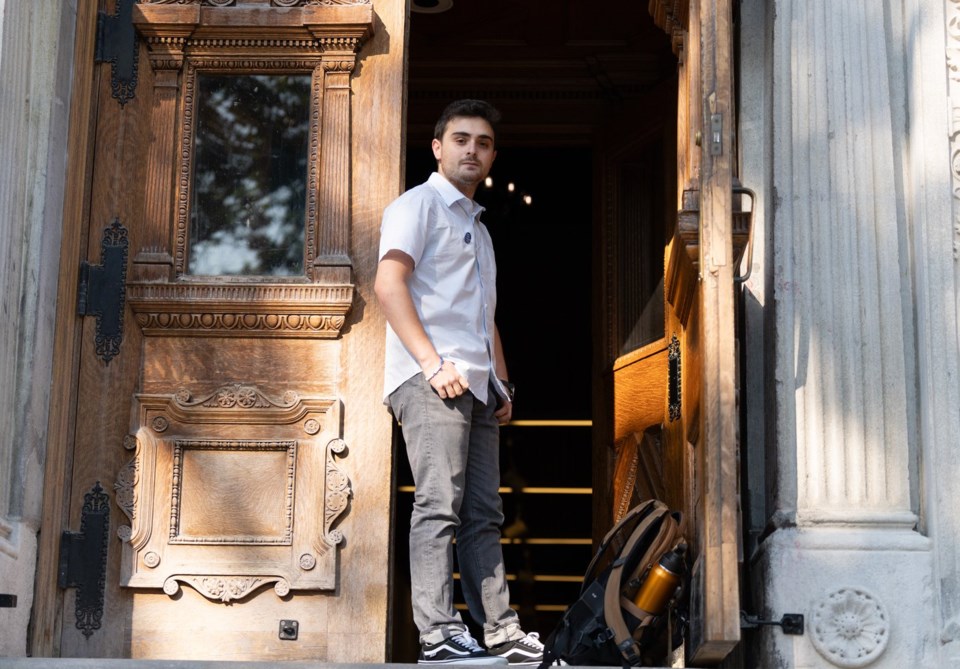WASHINGTON — Running between classes on the McGill University campus in Montreal, Jacob Wesoky's thoughts drift between assignments and class schedules. But there's another looming deadline for the political science and international development student: the U.S. election.
Wesoky, a 20-year-old from Virginia, is one of more than 2,000 American students studying at McGill. There are thousands more at universities across Canada, and Democrats are betting their ballots could play an important role come November.
"Students abroad can be, and often are, the margin of victory," said Wesoky, president of Democrats at McGill and executive vice-chair of Democrats Abroad in Canada.
The Democrat and Republican campaigns have begun a final, intense sprint following a tumultuous few months that included the attempted assassination of Donald Trump as well as President Joe Biden removing himself from the race.
A reinvigorated Democratic ticket with Vice-President Kamala Harris at the helm has seen gains in key battleground states but the tight contest continues with both parties spending hundreds of millions of dollars to attract voters.
While much of those efforts remain at home, there are pushes to rally support from the somewhat overlooked pool of Americans around the world.
Voters will be casting ballots for president and in some cases congressional candidates.
There are an estimated 2.9 million voting-age U.S. citizens who live, study or work overseas, an Election Assistance Commission report to Congress said. There are also about 1.4 million military members and their approximately 600,000 voting-age family members stationed away from home.
But only 3.4 per cent voted in the 2022 mid-term elections, the State Department says.
The largest group — more than 605,000 voting-age Americans — live in Canada.
"Democrats abroad are the Harris-Walz campaign secret swing state strategy," Wesoky said from Montreal this week.
Despite challenges posed by the COVID-19 pandemic, the last presidential election had record levels of people casting ballots — about two-thirds of the eligible population.
While only about 900,000 of the ballots counted were from overseas, those votes were extremely important, according to Democrats Abroad, the party's arm for Americans living outside the United States. Many were cast in swing states, including Georgia and Arizona, both of which Biden won by a margin of less than one per cent.
Democrats are hoping Americans around the world will put their support behind Harris and running mate Tim Walz this time around. The Democratic National Committee recently announced $300,000 to support Democrats Abroad's website, volunteers and advertisements.
In a close election everything matters, said the University of Pennsylvania's Marc Trussler
"Having additional overseas ballots in any of these close races could certainly be important," said Trussler, director of data science for the university's program on opinion research and election studies.
Trussler, who is Canadian, said it is a safe assumption that ballots from overseas citizens lean more Democratic and those from military members are more Republican. The vote from abroad is not a guarantee for any party, he said.
Republicans have been taking a different approach to voters beyond U.S. borders, said Georganne Burke, Canadian chapter lead for Republicans Overseas. Burke, a dual Canadian-American citizen, said she's skeptical of the Democrats' technique, particularly building their own website rather than directing people to federal government resources.
She is connecting on a personal level with Americans in Canada who might vote Republican.
"Our numbers, and I'm very honest about this, are much smaller than the Democrats, and we know this," she said. "Canada does attract more Democrat voters."
One of the most important rights of U.S. citizens, both at home and abroad, is the right to vote, said Ian Hopper, American citizen services co-ordinator for the U.S. Embassy and consulates in Canada.
"In Canada, we communicate regularly to U.S. citizens regarding options available to vote from overseas including through our website and our social media properties," Hopper said in an emailed statement.
Gregor Sharp, a 20-year-old student at the University of Glasgow in Scotland, said what he hears most from fellow Americans is that they didn't know they could vote or they weren't sure how. Overcoming that barrier is a main goal of Republican and Democratic efforts.
"Everyone is kind of feeling more enthused about this election and is interested in how they can engage in the upcoming elections," said Sharp, overseas director for College Democrats of America.
He said it is important that students don't delay requesting a ballot, as rules and timelines differ by state. Absentee ballots will be mailed out from North Carolina beginning Friday, and early voting will be underway soon after in at least four states — with a dozen more to follow by mid-October.
This report by The Canadian Press was first published Sept. 6, 2024.
— With files from The Associated Press
Kelly Geraldine Malone, The Canadian Press



